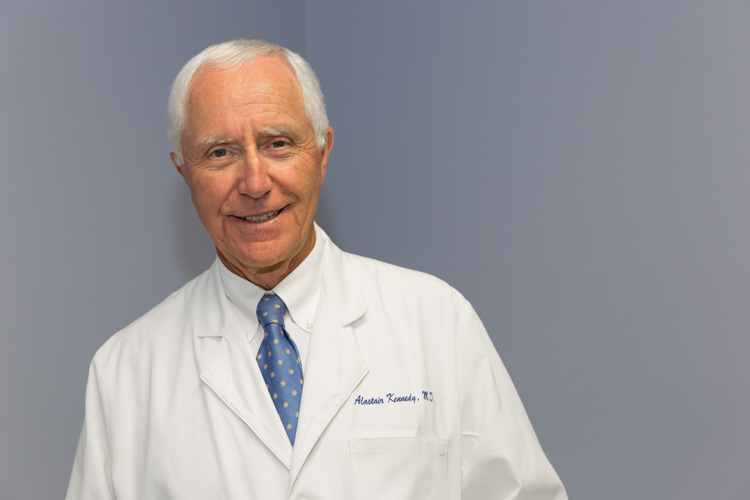One of the newest doctors at Cleveland Clinic Indian River Hospital is also one of its longest practicing ones.
Dr. Alastair Kennedy, who earned his medical degree at the University of Glasgow in Scotland, was in private practice in Vero Beach for 40 years before joining the hospital staff last month. And his Curriculum Vitae stretches back further still.
He held positions in pediatrics, obstetrics and cardiology before turning his talents to rheumatology and the treatment of musculoskeletal disease and systemic autoimmune conditions.
“I love medicine, I love the science of medicine,” Kennedy says. “I taught medicine in the U.K. and in South Africa and in Buffalo and I [still] get excited when I see the prospects.
“The last lecture I gave was about two or three years ago and it was to pre-med students. And I said, 50 years ago, I was sitting where you are right now. And then I looked back to where we were then and how we’ve moved forward – MRIs, CAT scans, keyhole surgeries – and when I was starting out there was about 12 drugs for everything. Now [there are thousands]. That’s my 50 years. Where do you think your 50 years are going to be?”
Why the switch to rheumatology?
As Kennedy explains, “I lost my best friend’s brother at the age of 19 to a very mysterious condition called ‘polyarteritis nodosa,’ which nobody knew anything about [at that time]. That was my first contact with unusual autoimmune diseases and that was when I switched.”
Polyarteritis nodosa, or PAN, according to the Cleveland Clinic, is a rare disease that “results from blood vessel inflammation or vasculitis that causes injury to organ systems of the body.”
Kennedy’s interest in autoimmune diseases actually predates the death of his friend’s brother.
His mother was a decorated nurse during World War II. “The only disease that terrified her was rheumatoid arthritis,” he says. “In those days, people just became totally locked into their bodies, destroyed by the disease.”
Today, Kennedy says, “we now have biologic agents” to treat that disease, and quickly adds, “If you get rheumatoid arthritis now, you’re never going to end up the way that my mother was terrified of.”
Another advance in medicine Kennedy applauds is the modern emphasis on collaboration between specialists.
For example, according to the American Society of Cataract and Refractive Surgery, “ophthalmologists and rheumatologists have a good deal of patient crossover. Patients with rheumatoid arthritis may have dry eyes or specific inflammatory processes involving the eye, such as scleritis and uveitis.”
Similarly, rheumatologist may receive referrals from pulmonologists for conditions like interstitial lung disease, pulmonary arterial hypertension, scleroderma and vasculitides, while rheumatologists may refer patients to pain specialists.
“We’re seeing the lines of orders narrowing and blurring,” Kennedy says happily, “because there’s so much overlap. Some of the treatments that we use were developed by the anti-cancer brigade and some of our treatments now are being used in cancer treatments.”
Asked why, after multiple decades in his own practice, he elected to join the staff at CCIRH, Kennedy quickly responds, “Well, I’m excited. I just wish I was 20 years younger. Cleveland Clinic is an exciting concept whereby we will be able to access some of the best medicine in the world and not just clinical medicine, but research medicine, too.”
He notes that research led to the new “biologic” drugs like Humira, Enbrel and Remicade now used to treat rheumatoid arthritis.
“Most of the major research that’s going on is coming from the United States. That’s the plus side.” The negative side, says Kennedy, is the cost of that is being borne by U.S. patients.
“I’ll give you one little story on that. Many years ago I was going over to Italy on vacation, and my friend here, an orthopedic surgeon, his son had a medical issue. Before I left, he called me and said, ‘Oh, would you mind checking out the price on the drug that my son has?’
“So I’m in Florence, I go to the local pharmacy, I ask the question, get the answer, and call him. It was one third of the price. Now, the drug was made in the States, shipped to Italy and it was a third of the price, which tells you that the American population is subsidizing stuff overseas.”
Ending on a high note, however, Kennedy points to the Health Department’s “We Care” program along with the sometimes dogged efforts of local physicians to persistently beat, beg and cajole drug makers into providing free or highly discounted medications for those who cannot afford them.
“There’s no excuse for anybody not to be treated – and effectively so – in this community,” he says.
Dr. Alistair Kennedy is a rheumatologist with Cleveland Clinic Indian River Hospital at 3450 11th Court, Suite 305 in Vero Beach. The phone number is 772-569-8550.

